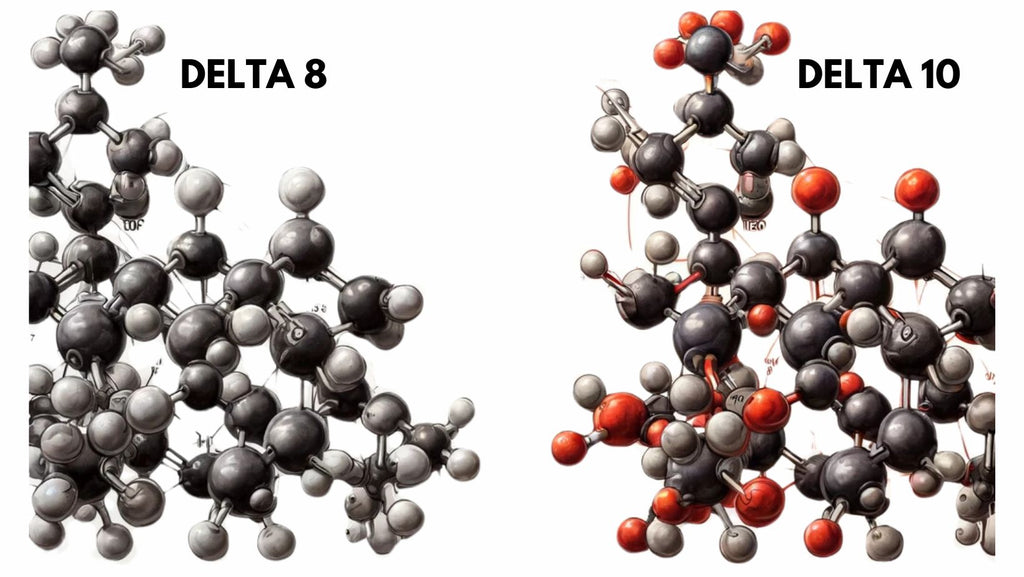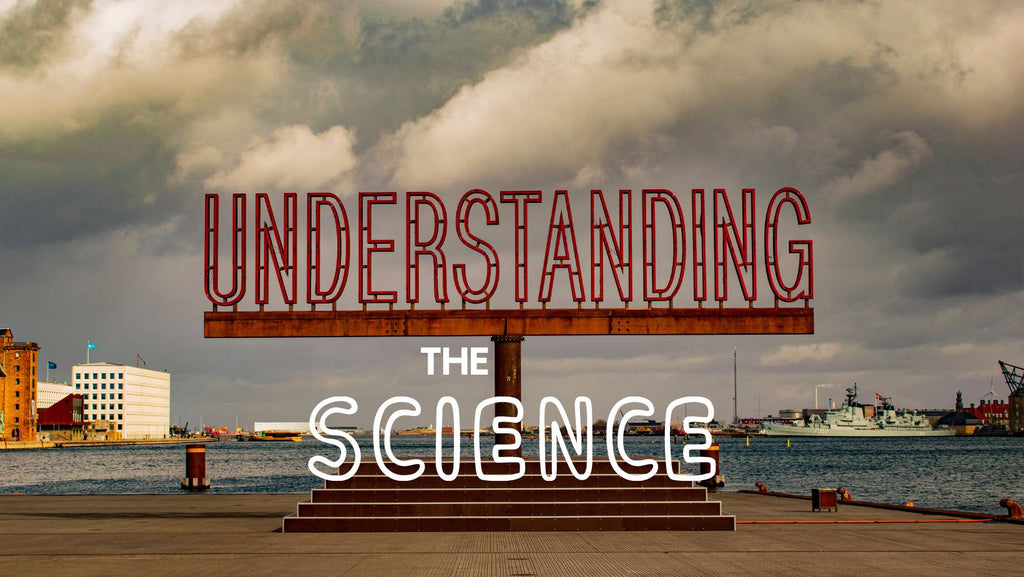

· By Hadiqa Abdullah
Delta 8 vs Delta 10
Explore key differences between Delta 8 vs Delta 10 to choose the right cannabinoid for your needs.
Delta 8 vs. Delta 10: A Detailed Guide to Choosing the Right Cannabinoid
When diving into the world of cannabinoids, particularly those less known than CBD or Delta 9 THC, it can be challenging to navigate the subtleties that differentiate options like Delta 10 and Delta 8. This guide aims to clarify the distinctions, effects, and potential uses of each to help you determine which cannabinoid might best suit your needs.

Whether you're looking for something to enhance relaxation, alleviate discomfort, or boost your mood, understanding the unique properties of Delta 10 and Delta 8 is crucial in making an informed choice.
We'll explore their chemical structure, effects, legal status, and more, providing a comprehensive overview to aid in your decision-making process.
Understanding Delta 8 vs Delta 10
Exploring the world of cannabinoids can be quite fascinating, especially when delving into lesser-known compounds like Delta 10 and Delta 8 THC. Both of these cannabinoids are structurally similar to Delta 9 THC but offer unique effects and benefits that set them apart not only from their famous counterpart but also from each other.
This section breaks down the fundamental aspects of Delta 10 and Delta 8, including what they are and their distinctive effects, to give you a clearer understanding of how each can potentially fit into your lifestyle and wellness routines.
What is Delta 8?
Delta 8 THC is also a minor cannabinoid, but it has gained more attention and availability in the market. It is similar to the more well-known Delta 9 THC but with reduced psychoactive properties. Delta 8 is praised for its ability to deliver a clear-headed, less anxious psychoactive experience, which includes relaxation and mood enhancement.
What is Delta 10?
Delta 10 THC is a cannabinoid found in trace amounts in the cannabis plant. Like Delta 8, it is often manufactured through extraction and processing methods that convert other cannabinoids into Delta 10. It's known for providing a mild high, often described as energizing and uplifting, making it popular among users seeking less intense psychoactive effects.
Effects of Delta 8 vs Delta 10
Delta 8 Effects:
- Relaxing
- Mood-enhancing
- Sleep-inducing at higher doses
- Appetite stimulation
- Anxiety reduction
- Pain relief
- Neuroprotective properties
Delta 10 Effects:
- Energizing
- Uplifting mood
- Enhances creativity
- Mild euphoria
- Less cognitive distortion
- Promotes alertness
- May help with focus
| Aspect | Delta 8 THC | Delta 10 THC |
|---|---|---|
| Psychoactivity | Reduced psychoactive properties | Provides a mild high |
| Common Effects | Relaxing, mood-enhancing, sleep-inducing at higher doses | Energizing, uplifting mood, enhances creativity |
| Specific Benefits | Anxiety reduction, pain relief, appetite stimulation, neuroprotective | Promotes alertness, may help with focus, mild euphoria |
| Market Presence | Gained more attention, more available | Found in trace amounts, often manufactured |
| User Experience | Delivers a clear-headed, less anxious experience | Often described as uplifting and less intense psychoactively |
Delta 8 vs Delta 10: Understanding the Science Behind the Cannabinoids
Delta 10 and Delta 8 THC are cannabinoids derived from the cannabis plant, but they differ significantly in their chemical structure and effects.
Both are analogs of THC (tetrahydrocannabinol), the primary psychoactive component of cannabis, but with subtle changes in the placement of double bonds in their molecular structures. This slight variation influences how they interact with the body's endocannabinoid system.

Delta 10 THC is a rare cannabinoid, and like Delta 8, it is often created through specific chemical reactions involving cannabinoids extracted from hemp. Delta 10 is structurally similar to Delta 9 THC but has the double bond on the tenth carbon chain, unlike Delta 9, which has it on the ninth.
This change affects how the cannabinoid binds to the CB1 and CB2 receptors in the brain, leading to different psychoactive effects.
Delta 8 THC also shares a close chemical relationship with Delta 9 THC, but the double bond is on the eighth carbon in the chain, altering its affinity for the CB1 receptor, located primarily in the brain.
This altered binding reduces the psychoactive intensity, providing users with a clearer high compared to Delta 9 THC and lessening anxiety and paranoia often associated with high doses of traditional THC.
Safety Profile: What You Need to Know About Delta 8 vs Delta 10
When considering the safety of cannabinoid products such as Delta 10 and Delta 8, it's crucial to understand both their general safety profiles and the potential side effects they may induce.
While both cannabinoids are derived from the cannabis plant and are similar in structure to Delta 9 THC, their unique chemical configurations confer slightly different safety considerations.
General Safety Considerations:
- Regulation and Quality Control: Both Delta 10 and Delta 8 are typically manufactured through chemical processes that alter cannabinoids extracted from hemp. The safety of these products greatly depends on the methods used in their synthesis. High-quality, well-regulated production methods ensure that harmful chemicals are removed, significantly reducing health risks.
- Source and Purity: The source of the hemp and the purity of the final product are vital. It's important to purchase products from reputable vendors who provide transparent third-party lab results to avoid contaminants that can be present in less scrupulously produced products.
Navigating the Legal Landscape: Delta 10 vs Delta 8 Regulations
Navigating the legal landscape of cannabinoids such as Delta 10 and Delta 8 can be challenging, as the regulations governing their use, production, and sale vary significantly across different jurisdictions.
Understanding these regulations is crucial for both consumers and businesses to ensure compliance and avoid legal complications.
Federal Regulations
Both Delta 10 and Delta 8 are cannabinoids derived from the hemp plant, and under the 2018 Farm Bill, hemp and its derivatives are federally legal as long as they contain less than 0.3% Delta 9 THC by dry weight.
However, the synthesis process used to create Delta 10 and Delta 8 from CBD may place these cannabinoids in a gray area under the law, as synthetically derived tetrahydrocannabinols are still considered controlled substances.

State Regulations
The state-level legal status of Delta 10 and Delta 8 varies, with some states explicitly legalizing or banning these compounds, while others have yet to address them directly in their legislation.
States where Delta 8 is legal:
- Alabama
- Florida
- Georgia
- Indiana
- Kansas
- Kentucky
- Missouri
- North Carolina
- South Carolina
- Tennessee
- Texas
- Virginia
- Wisconsin
- Wyoming
States where Delta 8 is restricted or banned:
- Alaska
- Arizona
- Arkansas
- Colorado
- Delaware
- Idaho
- Iowa
- Mississippi
- Montana
- Rhode Island
- Utah
- Washington
As for Delta 10, since it is newer to the market, explicit state regulations can be less clear, and it often falls under the same regulations as Delta 8 due to its similar synthesis process. It's advisable to check the current laws in your state as regulations can change rapidly.
Best Practices for Compliance:
- Stay Informed: Regularly review state and federal updates regarding cannabinoid regulations.
- Purchase from Reputable Sources: Buy products from vendors who comply with state laws and offer transparent third-party lab testing results.
- Be Cautious with Transport: Be aware of the laws in any state you are traveling to or through, as possession of Delta 10 or Delta 8 could be illegal.
User Reviews: Personal Experiences with Delta 10 vs Delta 8
User reviews offer invaluable insights into the real-world effects of Delta 10 and Delta 8, helping potential users make informed decisions based on the experiences of others.
Feedback commonly highlights Delta 10's energizing and uplifting effects, making it popular among those looking for a productivity boost without intense psychoactivity.
Conversely, Delta 8 is frequently praised for its calming effects, providing a relaxed yet clear-headed state that's ideal for stress relief or winding down at the end of the day.
- Delta 10 praised for energy and clarity
- Delta 8 favored for relaxation and mental calm
- Users report less anxiety with Delta 8 compared to stronger THC forms
- Delta 10 often chosen for daytime use; Delta 8 for evenings
- Both cannabinoids noted for minimal side effects
- Delta 8 commonly used for pain relief and sleep aid
- Delta 10 appreciated for enhancing social interactions and creativity
Delta 8 vs Delta 10: Potency and Consumer Guidance
When it comes to potency, Delta 10 and Delta 8 offer different experiences that cater to distinct needs. Delta 10 is typically less psychoactive than Delta 8, providing a lighter, more manageable high that is preferred by those who want to stay active and engaged.
Delta 8, while also less potent than Delta 9 THC, provides a more substantial relaxation effect, which can be perfect for those seeking significant stress relief or help with sleep.
- Understand your needs: Delta 10 for energy, Delta 8 for relaxation
- Start with low doses to assess individual reaction
- Consider the method of consumption; vapes act faster than edibles
- Check product purity and lab results for safety
- Delta 8 may be more suitable for evening use
- Delta 10 can be ideal for creative projects or social events
- Always comply with local laws regarding cannabinoid use
Which is Right for You? Delta 8 vs Delta 10 Comparison
Choosing between Delta 10 and Delta 8 depends on your specific needs, desired effects, and personal preferences.
If you are seeking a cannabinoid that enhances alertness, creativity, and social interaction without a heavy psychoactive burden, Delta 10 could be the right choice.
If your priority is to alleviate stress, manage anxiety, or improve sleep, then Delta 8 might be more appropriate.
- Assess your lifestyle and when you plan to use the product
- Consider any medical conditions that might benefit from one cannabinoid over the other
- Delta 8 is often recommended for those dealing with anxiety or insomnia
- Delta 10 could be better for those needing a mild uplift in mood and energy
- Consult with a healthcare provider if using cannabinoids for health issues
- Consider your experience with other THC products
- Understand that individual biochemistry affects how each cannabinoid is experienced
How to Choose Between Delta 10 and Delta 8: A Comprehensive Consumer’s Guide
Deciding between Delta 10 and Delta 8 THC hinges on understanding their distinct effects and how they align with your needs. Delta 10 is ideal for those seeking an energizing effect to enhance focus and creativity during daytime activities.
In contrast, Delta 8 is better suited for relaxation and stress relief, often preferred for evening use to aid in sleep or unwind after a long day.

When choosing, consider your tolerance and previous experiences with cannabinoids. Beginners might find Delta 8's milder effects more manageable, whereas experienced users might explore Delta 10 for a different kind of stimulation.
Product form is crucial too—Delta 8 gummies and delta 8 chocolates offer controlled dosing and prolonged effects, while delta 8 vapes and delta 8 flowers provide immediate relief.
Always check the legal status of these cannabinoids in your location, start with small doses to gauge their impact, and choose reputable brands to ensure product quality and safety.
Final Thoughts?
Choosing between Delta 10 and Delta 8 involves a careful consideration of each cannabinoid's unique characteristics and how they align with your personal preferences and needs.
Whether you're seeking relief from stress, a boost in creativity, or just a milder alternative to traditional THC, understanding the distinct effects of Delta 10 and Delta 8 is crucial.
By making informed decisions based on your specific goals and the legal landscape, you can optimize your experience and ensure safe and effective use of these cannabinoids.
FAQs
1. Can Delta 8 or Delta 10 show up on a drug tests?
Yes, both Delta 10 and Delta 8 can potentially trigger positive results on drug tests that screen for THC metabolites.
2. How should I store Delta 10 and Delta 8 products?
Store in a cool, dry place away from sunlight to prevent degradation. Airtight containers are recommended to preserve potency.
3. Are Delta 10 and Delta 8 suitable for cooking or baking?
Yes, both can be used in cooking or baking, but heat can alter their potency and effectiveness, so careful temperature control is essential.
4. Is there an age restriction for purchasing Delta 10 and Delta 8 products?
Yes, you typically must be at least 21 years old to purchase these products, depending on local state laws.
5. Can I travel with Delta 8 and Delta 10?
Be cautious as laws vary by state and country. Check the regulations of your destination and any places you may transit through.
6. How long do the effects of Delta 10 and Delta 8 last?
Effects can last from a few hours up to several hours depending on the dose, the individual's metabolism, and the mode of consumption.
7. Can Delta 10 or Delta 8 be used to treat medical conditions?
While not officially endorsed for medical use due to limited research, some users report benefits for conditions like anxiety, pain, and insomnia. Always consult with a healthcare professional first.
8. Are there any foods or medications I should avoid while using Delta 10 or Delta 8?
Avoid consuming alcohol and be cautious with medications that depress the nervous system, such as sedatives. Check with a healthcare provider for specific interactions.
9. How quickly do Delta 10 and Delta 8 take effect when vaped?
The effects are typically felt within minutes due to the fast absorption rate of inhalation.
10. Do Delta 10 and Delta 8 have any impact on appetite?
Yes, like many cannabinoids, Delta 8 is known to stimulate appetite. Delta 10's effects on appetite are less documented but could vary by individual.
